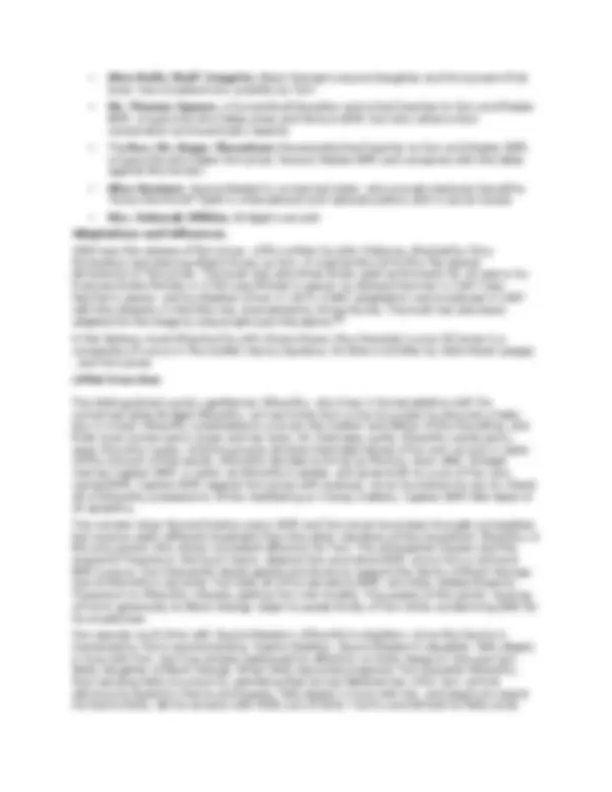





Study with the several resources on Docsity

Earn points by helping other students or get them with a premium plan


Prepare for your exams
Study with the several resources on Docsity

Earn points to download
Earn points by helping other students or get them with a premium plan
Community
Ask the community for help and clear up your study doubts
Discover the best universities in your country according to Docsity users
Free resources
Download our free guides on studying techniques, anxiety management strategies, and thesis advice from Docsity tutors
Tom Jones novel and drama
Typology: Exams
1 / 6

This page cannot be seen from the preview
Don't miss anything!




Key Facts
full title · Tom Jones
author · Henry Fielding
type of work · Novel
genre · Epic comic romance; Bildungsroman
language · English
time and place written · 1745, England
date of first publication · 1749
publisher · A. Millar, London
narrator · Anonymous
point of view · The narrator predominantly speaks in the first person singular, but
occasionally slips into a Victorian first person plural "we." The last quarter of the novel is partly epistolary, with letters embedded in the prose. The narrator is essentially omniscient and
fluctuates between the minds of various characters.
tone · The narrator's tone is constantly ironic. There has been much debate, however, about
what kind of irony Fielding employs, and critics have coined various terms to describe the narrative tone, which is unique to Fielding.
tense · Past / setting (time) · c. 1745 / setting (place) · England (mainly Somersetshire, Bristol, Upton, London)
protagonist · Tom Jones
major conflict · Tom Jones and Sophia Western cannot marry, since Tom is believed to be a foundling bastard and Sophia's father wishes her to marry someone of her own gentile class.
rising action · Tom and Sophia fall in love, Allworthy banishes Tom, Sophia runs away from Squire Western to London, Tom has an affair with Lady Bellaston.
climax · Tom is thrown into prison for "killing" Fitzpatrick in a duel. falling action · Tom's friends rally to reunite him with Sophia and clear his name, Blifil's deceit is discovered. themes · Virtue as action rather than thought, the impossibility of stereotypical categorization, the tension between Art and Artifice motifs · Food, travel, the law, the stage // symbols · Sophia's muff
foreshadowing · The narrator engages in constant self-conscious foreshadowing of the events of the upcoming chapter or book
The History of Tom Jones, a Foundling , often known simply as Tom Jones , is a comic novel by the English playwright and novelist Henry Fielding. The novel is both a Bildungsroman and a picaresque novel. First published on 28 February 1749 in London, Tom Jones is among the earliest English prose works describable as a novel, [1]^ and is the earliest novel mentioned by W. Somerset Maugham in his 1948 book Great Novelists and Their Novels among the ten best novels of the world. [2]^ Totaling 346,747 words, it is divided into 18 smaller books, each preceded by a discursive chapter, often on topics unrelated to the book itself. It is dedicated to George Lyttleton.
Though lengthy, the novel is highly organised; S. T. Coleridge argued that it has one of the "three most perfect plots ever planned."[3]^ Although critic Samuel Johnson took exception to Fielding's "robust distinctions between right and wrong", the novel was received with enthusiasm by the general public of the time. [ citation needed ]^ Tom Jones is generally regarded as Fielding's greatest book, and as a very influential English novel.[4]
The History of Tom Jones, a Foundling , often known simply as Tom Jones , is a comic novel by the English playwright and novelist Henry Fielding. The novel is both a Bildungsroman and a picaresque novel. First published on 28 February 1749 in London, Tom Jones is among the earliest English prose works describable as a novel, [1]^ and is the earliest novel mentioned by W. Somerset Maugham in his 1948 book Great Novelists and Their Novels among the ten best novels of the world. [2]^ Totaling 346,747 words, it is divided into 18 smaller books, each preceded by a discursive chapter, often on topics unrelated to the book itself. It is dedicated to George Lyttleton.
Though lengthy, the novel is highly organised; S. T. Coleridge argued that it has one of the "three most perfect plots ever planned."[3]^ Although critic Samuel Johnson took exception to Fielding's "robust distinctions between right and wrong", the novel was received with enthusiasm by the general public of the time. [ citation needed ]^ Tom Jones is generally regarded as Fielding's greatest book, and as a very influential English novel.[4]
List of characters
"Adorned with all the charms in which Nature can array her, bedecked with beauty, youth, sprightliness, innocence, modesty and tenderness, breathing sweetness from her rosy lips and darting brightness from her sparkling eyes, the lovely Sophia comes!" This depicts the heroine of the novel, but shows her in the latest fashions of 1800, rather
lover; has a bastard son, possibly by Tom
Blifil; a hypocrite who hates Jones and favours Blifil, but who refrains from conspiration and eventually repents
a hypocrite who hates Tom Jones, favours Master Blifil and conspires with the latter against the former)
"know the World" (both in international and national politics and in social mores)
Adaptations and influences
1963 saw the release of Tom Jones , a film written by John Osborne, directed by Tony Richardson and starring Albert Finney as Tom. It inspired the 1976 film The Bawdy Adventures of Tom Jones. The book was also three times used as the basis for an opera, by François-André Philidor in 1765 (see Philidor's opera), by Edward German in 1907 (see German's opera), and by Stephen Oliver in 1975. A BBC adaptation was broadcast in 1997 with Max Beesley in the title role, dramatised by Simon Burke. The book has also been adapted for the stage by playwright Joan Macalpine.[6]
In the fantasy novel Silverlock by John Myers Myers, the character Lucius Gil Jones is a composite of Lucius in The Golden Ass by Apuleius, Gil Blas in Gil Blas by Alain-René Lesage , and Tom Jones.
/// Plot Overview
The distinguished country gentleman Allworthy, who lives in Somersetshire with his unmarried sister Bridget Allworthy, arrives home from a trip to London to discover a baby boy in is bed. Allworthy undertakes to uncover the mother and father of this foundling, and finds local woman Jenny Jones and her tutor, Mr. Partridge, guilty. Allworthy sends Jenny away from the county, and the poverty-stricken Partridge leaves of his own accord. In spite of the criticism of the parish, Allworthy decides to bring up the boy. Soon after, Bridget marries Captain Blifil, a visitor at Allworthy's estate, and gives birth to a son of her own, named Blifil. Captain Blifil regards Tom Jones with jealousy, since he wishes his son to inherit all of Allworthy possessions. While meditating on money matters, Captain Blifil falls dead of an apoplexy.
The narrator skips forward twelve years. Blifil and Tom Jones have been brought up together, but receive vastly different treatment from the other members of the household. Allworthy is the only person who shows consistent affection for Tom. The philosopher Square and the reverend Thwackum, the boys' tutors, despise Tom and adore Blifil, since Tom is wild and Blifil is pious. Tom frequently steals apples and ducks to support the family of Black George, one of Allworthy's servants. Tom tells all of his secrets to Blifil, who then relates these to Thwackum or Allworthy, thereby getting Tom into trouble. The people of the parish, hearing of Tom's generosity to Black George, begin to speak kindly of Tom while condemning Blifil for his sneakiness.
Tom spends much time with Squire Western—Allworthy's neighbor—since the Squire is impressed by Tom's sportsmanship. Sophia Western, Squire Western's daughter, falls deeply in love with Tom. Tom has already bestowed his affection on Molly Seagrim, the poor but feisty daughter of Black George. When Molly becomes pregnant, Tom prevents Allworthy from sending Molly to prison by admitting that he has fathered her child. Tom, at first oblivious to Sophia's charms and beauty, falls deeply in love with her, and begins to resent his ties to Molly. Yet he remains with Molly out of honor. Tom's commitment to Molly ends
when he discovers that she has been having affairs, which means Tom is not the father of her child and frees him to confess his feelings to Sophia.
Allworthy falls gravely ill and summons his family and friends to be near him. He reads out his will, which states that Blifil will inherit most of his estate, although Tom is also provided for. Thwackum and Square are upset that they are each promised only a thousand pounds. Tom experiences great emotion at Allworthy's illness and barely leaves his bedside. A lawyer named Dowling arrives and announces the sudden and unexpected death of Bridget Allworthy. When the doctor announces that Allworthy will not die, Tom rejoices and gets drunk on both joy and alcohol. Blifil calls Tom a "bastard" and Tom retaliates by hitting him. Tom, after swearing eternal constancy to Sophia, encounters Molly by chance and makes love to her.
Mrs. Western, the aunt with whom Sophia spent much of her youth, comes to stay at her brother's house. She and the Squire fight constantly, but they unite over Mrs. Western's plan to marry Sophia to Blifil. Mrs. Western promises not to reveal Sophia's love for Tom as long as Sophia submits to receiving Blifil as a suitor. Blifil thus begins his courtship of Sophia, and brags so much about his progress that Allworthy believes that Sophia must love Blifil. Sophia, however, strongly opposes the proposal, and Squire Western grows violent with her. Blifil tells Allworthy that Tom is a rascal who cavorted drunkenly about the house, and Allworthy banishes Tom from the county. Tom does not want to leave Sophia, but decides that he must follow the honorable path.
Tom begins to wander about the countryside. In Bristol, he happens to meet up with Partridge, who becomes his loyal servant. Tom also rescues a Mrs. Waters from being robbed, and they begin an affair at a local inn. Sophia, who has run away from Squire Western's estate to avoid marrying Blifil, stops at this inn and discovers that Tom is having an affair with Mrs. Waters. She leaves her muff in Tom's bed so that he knows she has been there. When Tom finds the muff, he frantically sets out in pursuit of Sophia. The Irishman Fitzpatrick arrives at the inn searching for his wife, and Western arrives searching for Sophia.
On the way to London, Sophia rides with her cousin Harriet, who is also Fitzpatrick's wife. In London, Sophia stays with her lady relative Lady Bellaston. Tom and Partridge arrive in London soon after, and they stay in the house of Mrs. Miller and her daughters, one of whom is named Nancy. A young gentleman called Nightingale also inhabits the house, and Tom soon realizes that he and Nancy are in love. Nancy falls pregnant and Tom convinces Nightingale to marry her. Lady Bellaston and Tom begin an affair, although Tom privately, continues to pursue Sophia. When he and Sophia are reconciled, Tom breaks off the relationship with Lady Bellaston by sending her a marriage proposal that scares her away. Yet Lady Bellaston is still determined not to allow Sophia and Tom's love to flourish. She encourages anoter young man, Lord Fellamar, to rape Sophia.
Soon after, Squire Western, Mrs. Western, Blifil, and Allworthy arrive in London, and Squire Western locks Sophia in her bedroom. Mr. Fitzpatrick thinks Tom is his wife's lover and begins a duel with Tom. In defending himself, Tom stabs Fitzpatrick with the sword and is thrown into jail. Partridge visits Tom in jail with the ghastly news that Mrs. Waters is Jenny Jones, Tom's mother. Mrs. Waters meets with Allworthy and explains that Fitzpatrick is still alive, and has admitted to initiating the duel. She also tells Allworthy that a lawyer acting on behalf of an unnamed gentleman tried to persuade her to conspire against Tom. Allworthy realizes that Blifil is this very gentleman, and he decides never to speak to him again. Tom, however, takes pity on Blifil and provides him with an annuity.
Mrs. Waters also reveals that Tom's mother was Bridget Allworthy. Square sends Allworthy a letter explaining that Tom's conduct during Allworthy's illness was honorable and compassionate. Tom is released from jail and he and Allworthy are reunited as nephew and uncle. Mrs. Miller explains to Sophia the reasons for Tom's marriage proposal to Lady Bellaston, and Sophia is satisfied. Now that Tom is Allworthy's heir, Squire Western eagerly encourages the marriage between Tom and Sophia. Sophia chastises Tom for his lack of